- Home
- John Bellairs
Wrath of the Grinning Ghost Page 4
Wrath of the Grinning Ghost Read online
Page 4
The professor shrugged. "It has a cross on it, of course, and that is a symbol of good. And I suppose that if enough people have believed this little blob of silver was lucky over the years, some of their belief may have soaked into it. I'm not exactly a superstitious man, John, but if you think this trinket will bring you good luck, I really and truly hope it will." He read another passage in the coin book. "Anyway, it seems likely that this coin was made somewhere in Spanish America in the year 1656. My guess is that it was minted in Potosi, or in modern terms Bolivia, because that's where the ones with better workmanship originated. And it may very well have been part of a pirate's treasure. In the sixteenth and seventeenth centuries, Spanish galleons sailed from the Caribbean to Spain loaded to the scuppers with gold and silver, and pirates loved to prey on them."
Johnny picked up the coin and held it on his palm. He let the light from the window catch it as he tilted the coin to stare down at the faint impression of the cross stamped into the ancient silver. The figure was like a capital T, except that the crossbar went right through the center of the vertical line. The ends of the crosspieces were flattened out, so the design looked like this:
Just staring at the cross gave Johnny a mysterious, peaceful feeling, and he felt his mind clearing. Then he started. "Oh, my gosh!" he cried, his eyes wide. "I forgot about the book! I forgot all about it!"
"This book?" asked the professor, holding up the one he was reading. Behind his spectacles, his eyes were wide and questioning.
"No, the one that my dad found down on Live Oak Key in Florida," replied Johnny. He shook his head. "How could I have forgotten it? It scared me half out of my mind!" His words tumbling over each other so that Professor Childermass had to slow him down a couple of times, Johnny explained about the book and the weird feeling it had given him. He told about the nightmare too, and the strange, snaky, misty thing that had seemed to rise from the tome as it lay on the floor. Professor Childermass listened, a frown of concentration making deep lines on his face.
When Johnny finished, the professor pulled at his nose. He looked intensely troubled. At last he grunted and said, "Mysteriouser and mysteriouser, as old Lewis Carroll might have put it." He leaned across the desk, his eyes glittering behind his gold-rimmed spectacles. "Tell me again about the writing you saw in this book. Was it Arabic? Chinese? Egyptian hieroglyphics? Would you recognize the language if I could show you a sample of it?"
"I don't think so," replied Johnny slowly. "It's hard to explain. I mean, the marks looked like letters, but they didn't look like a real language, if you understand me."
"Not exactly," answered the professor. He growled in his throat, as he sometimes did when feeling frustrated. "It sounds like a real puzzler. Very well! I'm going to call my old friend Charley Coote and ask him if he knows anything about that sort of book. He's an expert in magic, after all, and this tantalizing tome you're describing sounds as if it might be magical. What did you do with the wretched thing, by the way?"
Johnny wrinkled his forehead in thought. "Nothing," he said slowly. "That's the strangest part of the whole story. I don't know what happened to the book. It just disappeared from where I dropped it."
"Your father didn't pick it up?" asked the professor. "Think, John. It might be important."
Johnny shook his head. "No. It was in my room, and he didn't even come in there the next morning. I'm pretty sure Dad forgot all about the book too. Anyway, he never mentioned it to me again after that night."
Professor Childermass sighed. He raised his hands in mock surrender. "Babbling birds, sinister snakes, and vanishing volumes! Well, this is too deep for me! What did the poet Robert Burns say? 'The best laid schemes o' mice and men gang aft a-gley.' Know what that means?"
Johnny, sure that the professor would tell him, shook his head.
"It means," said Professor Childermass, "that no matter how well you plan and plot, fate always comes along and heaves a monkey wrench into the works! Take me, for example. I thought I was going to take the summer off and loaf, bake cakes, and beat you at chess. Libraries and books and research projects were the last things on my mind, but your adventure down in Florida calls for a little investigation. Tell you what, John. Give me a couple of days to work on these problems. We'll drop the whole subject until then, unless you manage to recall anything more about this blasted book that gave you the galloping woo-hoos. After I've found out a thing or two, we'll get together and see what's what. Is that agreeable?"
"Sure," replied Johnny, and they left it at that.
* * *
During the next two days, Johnny fretted only a little over the mysterious book and the lucky coin. Most of the time, he and Fergie found plenty to do, and when Johnny was busy, he didn't have time for worrying about possible disasters.
He and Fergie rode their bikes all over Duston Heights. They went looking for arrowheads in the park past Emerson Street, where a brook meandered among a chain of ponds. Sometimes in dry weather they found the arrowheads sticking out of the soil among the stones in the banks of the brook. Fergie had quite a collection of them, with the best ones displayed on black velvet in a wood and glass frame.
When they got tired of amateur archaeology, the two boys gobbled rich, gooey banana splits or hot fudge sundaes in Peter's Sweet Shop, an ice-cream parlor with an old-fashioned soda fountain. Johnny liked the marble counter and high stools and deep wooden booths with curly sides. There were colored glass lamps, and a jukebox, plus a display case up in front with boxes of candy in it. The soda shop always smelled friendly, its air sweet with chocolate and vanilla and spicy with cinnamon.
After they had stuffed their faces, Johnny and Fergie went to an afternoon matinee at the movie theater and sat through a double feature of horror films, The Beast from 20,000 Fathoms and It Came from Beneath the Sea. One movie was about a giant octopus terrorizing San Francisco, and the other about a dinosaur that had been frozen in the Arctic ice but came to life. Johnny and Fergie found both films more funny than scary, and Fergie laughed so hard during the second one that a grumpy usher shone his flashlight at the two boys and threatened to throw them both out.
They spent some time in the cool, dusty stacks of the library, reading up on Spanish treasure and pirates. When they felt cramped from being inside, they played long games of flies and grounders. Fergie was much better at baseball and all other sports than Johnny would ever be, but Johnny had come along with some coaching from Sarah, and now he didn't feel quite so helpless with a bat or a ball in his hands.
In other words, Johnny and Fergie enjoyed the gorgeous summer. The season was still young. June was not even halfway over, and exciting weeks stretched out ahead of them before school would start again in the fall. The two friends knew how much fun they could cram into those weeks, and both of them looked forward eagerly to the rest of the summer.
On Saturday afternoon Johnny and Fergie rode their bikes back from the park after a long session of flies and grounders. As they whizzed through Duston Heights, Johnny was in the lead, with Fergie behind him, weaving his bike back and forth and pretending to be the pilot of a fighter plane. "You're in my sights, Dixon!" he yelled now and then. "Better take evasive action! I'm firin' my fifty-caliber machine guns! Ack-ack-ack-ack-ack! Zzz-aaa-oww!" People they passed looked at them as if they were both crazy.
They pumped up the long hill on Fillmore Street, past the vacant Barton house two doors down from the professor's house. They turned sharply to the right and rolled into Johnny's yard and let their bikes fall clattering to the grass. Gramma Dixon was in the front parlor, reading a magazine and listening to dance music on the radio. She greeted Johnny and Fergie with a smile as they headed for the kitchen, where Johnny poured chocolate milk for both of them. "Johnny," Gramma called, "remember, Grampa wants you to mow the lawn this afternoon."
"Okay," Johnny yelled back. He asked Fergie, "Want to help?"
Fergie rolled his eyes. "Sure, John baby! I love to spend my Saturday afternoons slavin' awa
y instead of havin' fun!" He lifted his chocolate milk. "Here's to the workers of the world! All they have to lose is their lawn mowers!"
Johnny shrugged. "Well, you don't have to if you don't want to. I can do it myself."
"Nah," said Fergie with a grin. He wore a mustache made of chocolate milk, but Johnny didn't point that out. "It's faster an' easier if we take turns. And the sooner we get work outa the way, the sooner we can dream up somethin' fun to do. I hate to admit it, John baby, but I'm already startin' to get a little bored with the summer."
So they dragged the lawn mower out and started on the backyard. Despite Gramma's frequent suggestions, Grampa Dixon had refused to buy a gasoline mower. The only sort he liked was the old-fashioned push kind, with big black rubber wheels and shiny spiral blades that made a metallic whirring noise when you rolled it along. Grampa Dixon insisted that the push mower did a neater job, and it was cheaper too, because it ran by muscle power alone.
The lawn mower required a lot of that. Leaning forward as he mowed, Johnny pushed it, fascinated by the green arc of grass clippings that it sent spraying up. Grampa was right about one thing. The mower did leave the lawn smooth and level as a billiard table. Johnny did half the backyard, then Fergie took over and finished the job. After drinking a glass of water apiece, they dragged the mower to the front of the house and began working on the lawn there. Grampa, who had been upstairs taking a nap, heard them and came out with his clippers and tidied up the hedges.
Johnny sighed as he started on the last strip of long grass. If he could have had any wish in the world just at that moment, it might have been for summer to go on forever just like this, with him having fun with Fergie (and, when she got back, with Sarah), his family happy, and no cloud of worry on the horizon. Even work didn't seem much of a hardship when he shared it with Fergie, and the whirr of the lawn mower, the snip-snip-snip of Grampa's clippers, seemed like just another kind of music, like the summer songs of cardinals and crickets.
It was a wish that would not come true. Johnny didn't know what terrible events were about to burst upon him.
CHAPTER FIVE
For some time Professor Childermass did not have any news for Johnny. Then, right after lunch on Monday, Johnny recognized an old blue Chevrolet parked at the curb in front of the professor's house. It belonged to Dr. Charles Coote, a specialist in the folklore of magic who taught at the University of New Hampshire. Johnny hurried across Fillmore Street to see what news Dr. Coote had brought.
Professor Childermass met Johnny at the door. He held the screen open with a broad smile of welcome on his face. "Greetings, John! I was just about to call you over when I glanced through the screen door and saw you coming. Charley just got here, and he has some information that may pertain to the book you found down in Florida. No, don't ask questions. He hasn't told me a solitary thing yet. Come on up to the study, and we'll see what he knows."
Dr. Coote was waiting for them. He sat in the overstuffed armchair near Professor Childermass' desk. A tall, weedy, slightly stooped man with fluffy white hair, a long, ridged, bent nose supporting horn-rimmed glasses, and the air of an absent-minded professor, Dr. Coote smiled at Johnny. "Hello," he said, opening a thick manila folder on his skinny knees. "Well, this time you gave me a poser! However, I may have learned a thing or two that might help, so sit down and I'll tell you about invented languages and mysterious books."
Johnny took the straight chair on the other end of the desk, with the stuffed owl at his right elbow, and Professor Childermass settled himself in his rolling chair behind the desk. "All right, Charley," he said. "We're all ears."
Dr. Coote coughed. He made a tent of his fingers and peered over the top rims of his spectacles. "Ah, first, perhaps Johnny should describe this book to me as precisely as he can. I only know what Roderick has told me, you see, Johnny, and he's rather elderly and forgetful."
"Elderly! Forgetful!" erupted Professor Childermass. "Why, you pompous pedant, I—I challenge you to a brain-wrestling match!"
"Never mind him," said Dr. Coote with a wink at Johnny. "Just tell me the story in your own words, as they say in the courtroom dramas."
"And whose words do you think he'd use?" asked Professor Childermass with a snort. "Robert Cawdrey's? Samuel Johnson's? Noah Webster's? They all wrote dictionaries, didn't they?"
"Please, Roderick," scolded Dr. Coote with mock severity. "Go ahead, Johnny."
Closing his eyes to imagine the strange writing and drawings, Johnny described the odd book as well as he could. Dr. Coote listened with a look of concentration on his thin features, nodding encouragingly now and then and sometimes tapping the tips of his fingers together thoughtfully. When Johnny finished, the elderly man shuffled through a thick stack of papers in his folder. "Let me see, let me see," he murmured. "Hmm. Yes. Was it anything like this?" He handed Johnny a slick sheet of photostat paper.
Johnny took it from him. The photocopy showed a page of strange cursive writing, with a peculiar plant rising through the words. The plant's roots spread out along the bottom edge of the page, its stem rose and curved to the left, and from it hung flowers that looked like church bells. Johnny had studied Latin in school, and the letters looked a little like the old-fashioned Latin manuscript letters used by monks in the Middle Ages. The markings were not real letters, though, and they made no sense. "It was sort of like this," said Johnny. "The letters were different, though. Some of these look like a's and o's, but the letters in the book that I saw didn't resemble any alphabet I know of. Where did this come from, Dr. Coote?"
"From the Voynich Manuscript," answered Dr. Coote. "The original is hand colored and is actually rather attractive, in a bizarre sort of way. This black-and-white copy really doesn't do it justice."
Professor Childermass pounded his fist on the desk. "Charley! You're a scholar, not some kind of art critic! What in thunder is this manuscript? You never tell a story the right way! Begin at the beginning!"
Dr. Coote smiled and coughed again. "Well, Roderick, that is a bit difficult to do. You see, no one really knows where the true beginning, well, begins. In this century, the manuscript was discovered by a man named Wilfrid Voynich. He found it at the Jesuit college of the Villa Mondragone in Frascati, Italy, and purchased it in the year 1912. He published a description of it in 1921, and not long after that he made photostatic copies available to scholars. No one who has seen the manuscript has ever been able to read it or even to make a guess about who wrote it, or when. Some people believe it may date all the way back to the English scholar and magician Roger Bacon, who lived in the late 1200's. Clues in the manuscript suggest that it is in some kind of code, but no one can even determine the language in which it is written, much less decode the message. It has been a deep, dark mystery ever since Mr. Voynich discovered the work."
"And where does that leave us?" asked Professor Childermass.
Dr. Coote shrugged. "Nowhere, I'm afraid. There are other peculiar books from the medieval period with strange symbols in them, but most of these have to do with alchemy and magic. What Johnny describes sounds much more like the Voynich Manuscript than anything else—that is, an herbal."
"Terrific," snarled the professor. "We have no clues at all."
"What is a—an herbal?" asked Johnny.
Dr. Coote answered him: "An herbal is simply a description of plants. The Voynich Manuscript includes some pictures of anatomy too, along with other things, but a large part of it is taken up with drawings of various flowers and other kinds of flora. Except the plants pictured are not of this world."
"Oh, wonderful," growled the professor, his face getting redder by the second. "What world are they from, then? Martian melons? Plutonian plums? Moon mushrooms?"
"Now, now, Roderick." Dr. Coote shifted uneasily in his chair. His mild face took on an expression of vague worry. "The truth is, no one knows what strange realm of time or space may be pictured in the Voynich Manuscript. Perhaps it is totally imaginary. Or just possibly, it is a place that
one could not reach by automobile, ship, or airplane. It may be another, ah, region altogether."
"Peachy," muttered Professor Childermass. "Just peachy. Well, if we can't get there by streetcar, I'm not planning to go! Now, have you anything to suggest, Charley? Anything practical, that is?"
"Only the obvious." Dr. Coote gave Johnny a sympathetic smile. "It would help if I could actually examine this book. Unfortunately, I gather the chances of that are slim."
Johnny felt as if he were letting his friends down. He hung his head. "I don't know where it is," he said in a small voice.
"Well, I think—" began the professor, only to be cut off by a sharp ring from the telephone downstairs. "Drat! Let me see who that is, and it had better not be a wrong number!"
While he was gone, Dr. Coote said, "One thing might help. You say the manuscript you found was bound like a book. Describe the binding for me."
Johnny did his best. When he had finished, the old man said, "The binding was probably done late in the last century. The kind of marbled paper you describe was frequently used in bookbinding from about 1880 on. From your description, though, the pages inside the binding sound as if they are much older. Perhaps even medieval. Were they regular paper?"
"I think so," said Johnny slowly. "They didn't look like parchment."
"Possibly vellum," reflected Dr. Coote.
Professor Childermass came back into the study, a smile of satisfaction on his face. "John," he said, "that was the post office. They are holding a package for me. My friend in New York sent it C.O.D. for some reason. Would you be willing to ride your bicycle into town and pick it up for me?"
"Sure, Professor," Johnny said, rising from his chair.

 The Curse of the Blue Figurine
The Curse of the Blue Figurine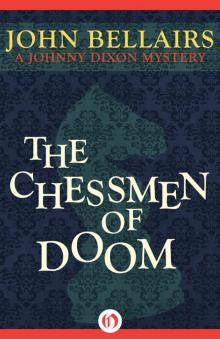 Chessmen of Doom
Chessmen of Doom Secret of the Underground Room
Secret of the Underground Room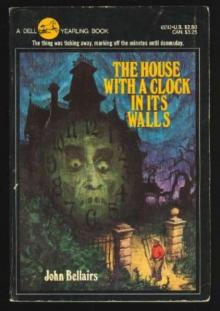 The House With a Clock in Its Walls
The House With a Clock in Its Walls The Vengeance of the Witch-Finder
The Vengeance of the Witch-Finder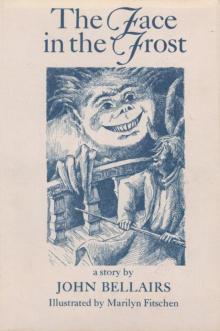 The Face in the Frost
The Face in the Frost Revenge of the Wizard's Ghost
Revenge of the Wizard's Ghost Spell of the Sorcerer's Skull
Spell of the Sorcerer's Skull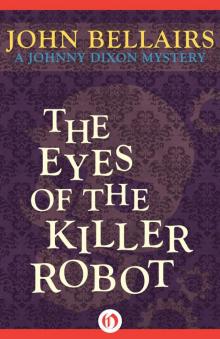 Eyes of the Killer Robot
Eyes of the Killer Robot Mummy, the Will, and the Crypt
Mummy, the Will, and the Crypt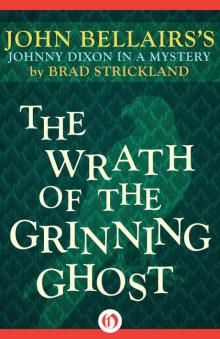 Wrath of the Grinning Ghost
Wrath of the Grinning Ghost The Mansion in the Mist
The Mansion in the Mist The Doom of the Haunted Opera
The Doom of the Haunted Opera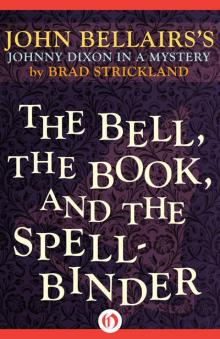 The Bell, the Book, and the Spellbinder
The Bell, the Book, and the Spellbinder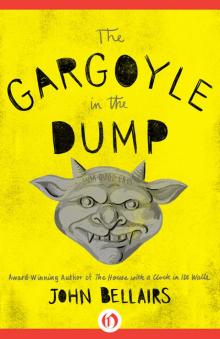 The Gargoyle in the Dump
The Gargoyle in the Dump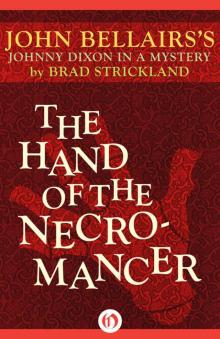 The Hand of the Necromancer
The Hand of the Necromancer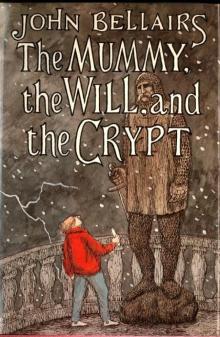 The Mummy, the Will, and the Crypt
The Mummy, the Will, and the Crypt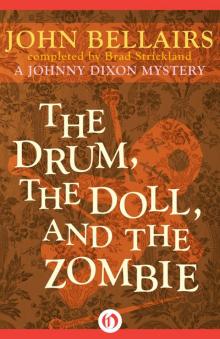 Drum, the Doll, and the Zombie
Drum, the Doll, and the Zombie The Specter from the Magician's Museum
The Specter from the Magician's Museum The Letter, the Witch, and the Ring
The Letter, the Witch, and the Ring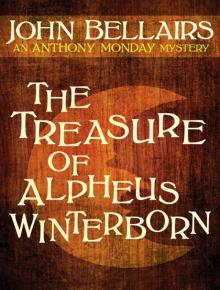 The Treasure of Alpheus Winterborn
The Treasure of Alpheus Winterborn The Dark Secret of Weatherend
The Dark Secret of Weatherend The Figure in the Shadows
The Figure in the Shadows